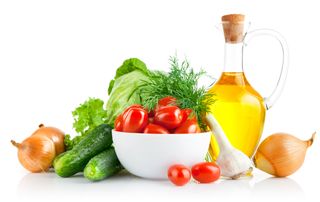Nutrition Science

Eating well is becoming more and more of a science, with new research showing us which foods may lower our risk of disease, and which are increasingly pointed to as the culprits behind ill health. Researchers are looking to better understand how nutrients work in our bodies, with studies that analyze at the diets of people with heart disease, cancer, and other diseases, along with research aimed at helping people to lose weight, or maintain weight loss. From all this research, new advice constantly emerges for people who are dieting, or want to eat more healthfully. With news, features and reference pages, we will provide science-supported tips for improving your nutrition.
Latest about Food & Diet

Does it really take 20 minutes to realize you're full?
By Anna Gora published
There's a time gap between when you've eaten enough to satisfy your hunger and when the brain actually realizes that you are full. Why?

Eating meat may not have 'made us human,' contrary to popular theory
By Katharina Menne published
Meat-eating may not have made us human after all, say paleoanthropologists.

Why do beets turn your poop and pee red?
By Anna Gora published
After you've eaten beets, your poop and urine can take on a shocking red or pink color — but why?

How long does it take to digest food?
By Anna Gora published
The speed at which food moves through the digestive tract depends on many factors.

Which foods make the smelliest farts?
By Elana Spivack published
Gastroenterologists describe the factors that go into passing gas and which foods make farts smell.

Why do some people think cilantro tastes like soap?
By Donavyn Coffey published
Here's the science behind why some people hate eating cilantro, which is also known as coriander.

Scientists identify the microbes that make buffalo mozzarella so yummy
By Emily Cooke published
An analysis of buffalo mozzarella from two Italian dairies has revealed which bacteria define this beloved cheese.

Can sugar cause acne?
By Kamal Nahas published
Because multiple factors can provoke acne, it's difficult to tease apart sugar's role.
Live Science newsletter
Stay up to date on the latest science news by signing up for our Essentials newsletter.
